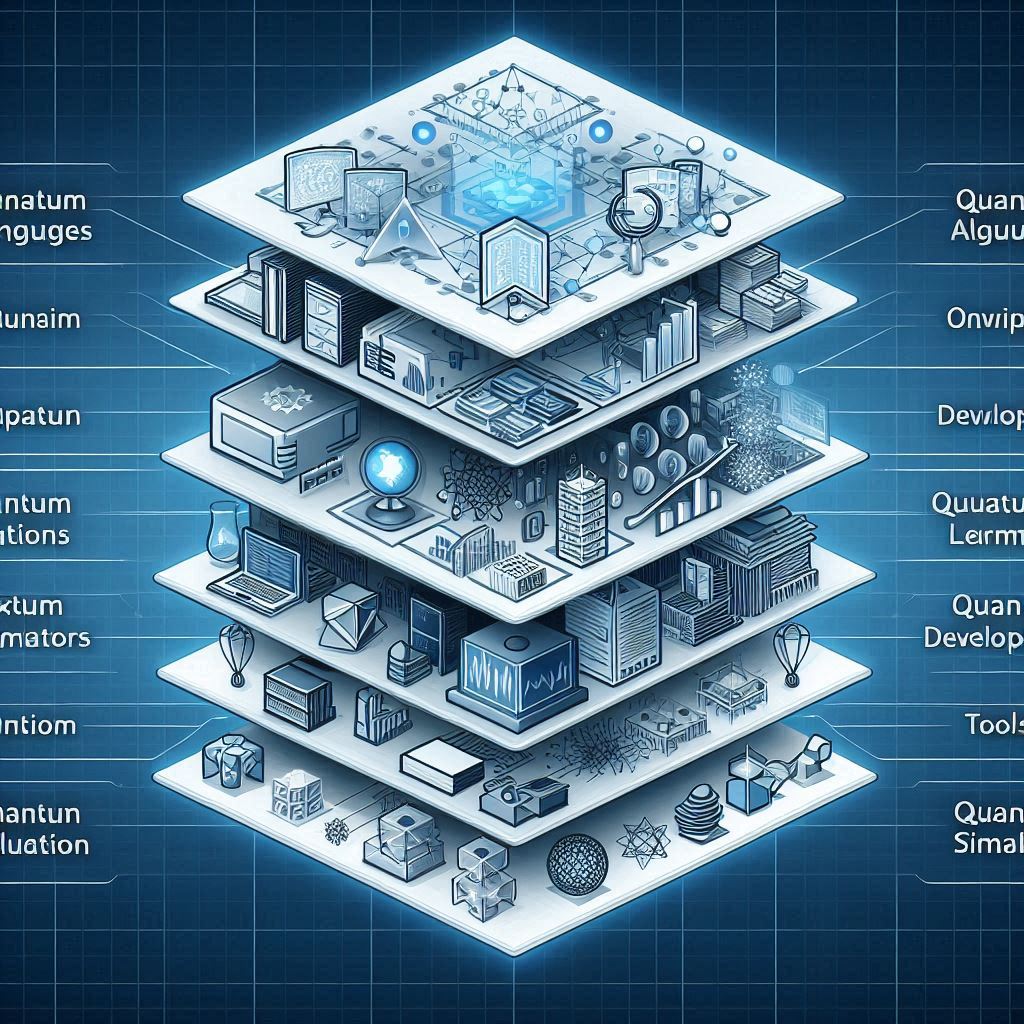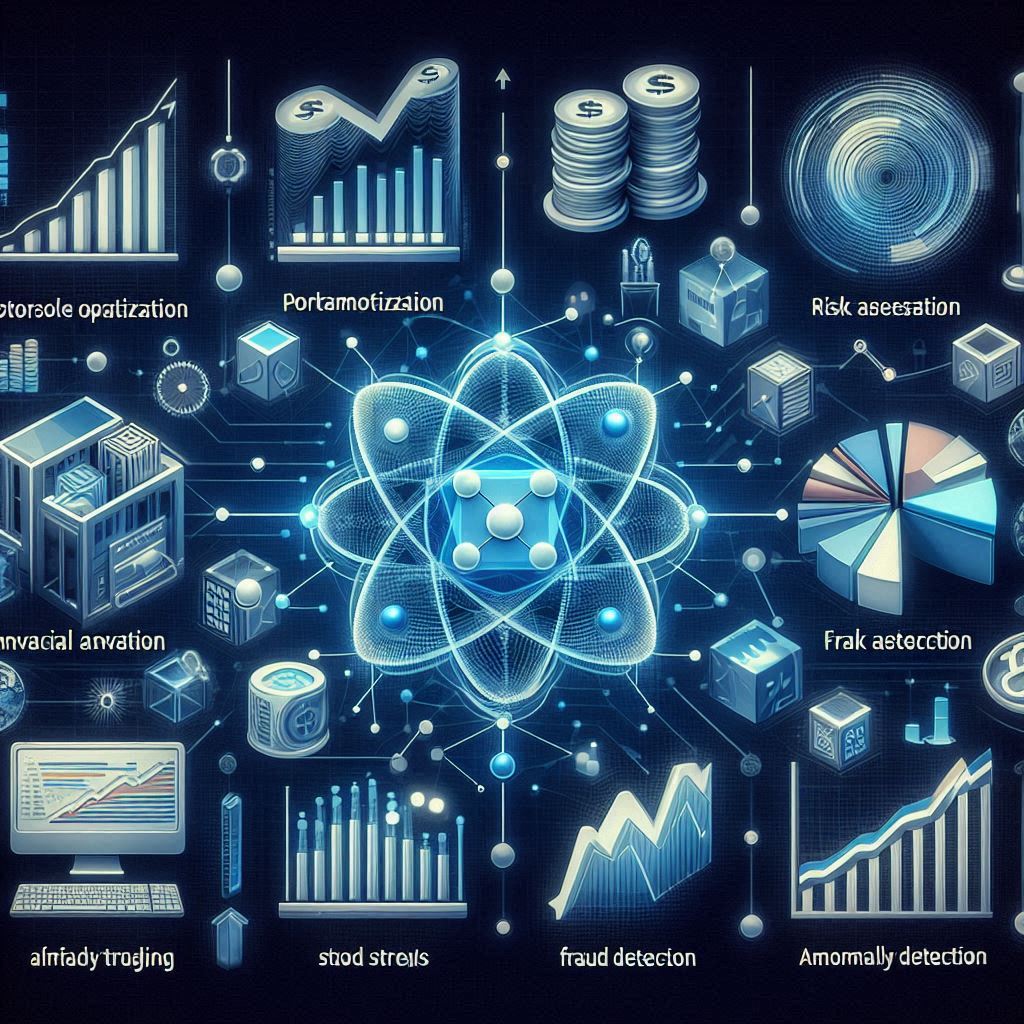Quantum Computing – The Next Frontier
Quantum computing, once confined to the realm of theoretical physics, is quickly becoming a tangible reality. While still in its nascent stages, the technology has demonstrated immense potential to revolutionize industries and solve complex problems beyond the reach of classical computers.
This article delves into the future of quantum computing, exploring emerging trends, potential breakthroughs, and the challenges that lie ahead. By examining the current landscape and envisioning potential outcomes, we aim to shed light on the transformative impact this technology will have on society.

Quantum Hardware Advancements:
Scalability Challenges
Building larger quantum computers is hindered by several key challenges:
- Qubit Count and Coherence: Increasing the number of qubits is crucial for solving complex problems. However, adding more qubits amplifies quantum noise, reducing coherence time – the duration qubits maintain their quantum state. This delicate balance between qubit count and coherence is a critical challenge.
- Cross-Talk: As qubits are packed closer together to increase density, the risk of qubits interfering with each other (cross-talk) grows exponentially. Minimizing cross-talk is essential for maintaining qubit fidelity and preventing errors.
- Control Electronics: Managing and controlling a large number of qubits requires sophisticated control electronics. These systems must operate at extremely low temperatures, consume minimal power, and introduce minimal noise to the qubits.

Error Correction Breakthroughs
To realize the full potential of quantum computing, robust error correction is indispensable:
- Quantum Error Correction Codes: These complex mathematical codes protect quantum information by encoding it redundantly across multiple qubits. Techniques like the Shor code and surface codes are actively being researched and implemented.
- Topological Quantum Computing: Leveraging exotic states of matter, topological quantum computing offers the promise of inherent fault tolerance. However, creating and manipulating these topological states remains a significant challenge.
- Surface Codes: A leading contender in error correction, surface codes involve arranging qubits in a 2D lattice. By introducing redundancy and error detection mechanisms, these codes can correct errors without destroying quantum information.
New Hardware Approaches
While superconducting qubits dominate the current landscape, other promising technologies are emerging:
- Trapped Ion Qubits: Using electromagnetic fields to trap and manipulate individual ions, these qubits offer long coherence times and high-fidelity operations. However, scaling up trapped ion systems can be complex.
- Photonic Quantum Computing(Photonic Qubits): Leveraging photons as qubits, this approach promises fast computation and low noise. Challenges include efficient photon generation, manipulation, and detection.
- Neutral Atoms: Using laser-cooled neutral atoms as qubits, this technology offers the potential for large-scale quantum computers with high qubit counts. However, controlling individual atoms with precision remains a challenge.
- Silicon Spin Qubits: Integrating qubits into the well-established silicon chip manufacturing process could lead to scalable and cost-effective quantum computers. However, achieving long coherence times and strong qubit coupling in silicon remains a significant hurdle.
Each hardware platform presents unique advantages and challenges. The optimal path forward may involve hybrid systems combining the strengths of different technologies.
Quantum Software and Algorithms: The Software Side of Quantum Computing
Quantum computing is not just about hardware; it also requires sophisticated software and algorithms to unlock its full potential.
Quantum Software Development
Developing software for quantum computers is a complex task that demands new programming paradigms.
- New Programming Languages: Quantum computing requires languages specifically designed to handle the unique characteristics of qubits and quantum operations. Languages like Qiskit (IBM), Cirq (Google), and PyQuil are emerging to meet this need.
- Quantum Compilers: Compilers translate human-readable code into instructions that can be executed on quantum hardware. Optimizing quantum circuits for efficient execution is a critical challenge.
- Quantum Software Stacks: Building comprehensive software stacks that include development tools, simulators, and compilers is essential for a thriving quantum software ecosystem.

Quantum Algorithm Development
Creating quantum algorithms requires a deep understanding of both computer science and quantum mechanics.
- Quantum Algorithms: Researchers actively develop quantum algorithms for specific problem domains, such as optimization, machine learning, and chemistry simulations.
- Quantum Machine Learning: Combining quantum computing with machine learning has the potential to revolutionize data analysis and pattern recognition.
- Quantum Simulation: Simulating quantum systems on quantum computers can lead to breakthroughs in materials science, drug discovery, and other fields.
Quantum Machine Learning
Quantum machine learning is an emerging field that aims to leverage quantum computing to enhance machine learning capabilities.
- Quantum Neural Networks: Researchers are exploring the development of quantum neural networks, which could potentially outperform classical neural networks on certain tasks.
- Quantum Support Vector Machines: Quantum computing can accelerate the training and inference of support vector machines, leading to improved performance.
- Quantum Reinforcement Learning: Combining quantum computing with reinforcement learning could enable the discovery of optimal strategies in complex environments.
Developing robust quantum software and algorithms is crucial for realizing the full potential of quantum computers. As hardware capabilities continue to improve, advancements in software and algorithms will be essential to drive practical applications.
Quantum Computing in Industry:
Finance and Economics
Quantum computing has the potential to revolutionize the financial industry:
- Portfolio Optimization: By processing vast datasets of financial information, quantum computers can identify optimal investment portfolios, maximizing returns while minimizing risk.
Quantum algorithms can explore multiple potential portfolios simultaneously, leading to more efficient and robust investment strategies.
- Risk Assessment: Quantum computers can model complex financial systems with unprecedented accuracy, enabling financial institutions to better assess and manage risks. This includes tasks like credit risk assessment, market risk analysis, and operational risk management.
- Fraud Detection: Quantum computing can detect anomalies in financial data that traditional methods might overlook. By processing vast amounts of data in real time, quantum algorithms can identify fraudulent activities more efficiently.

- High-Frequency Trading: Quantum computing’s ability to process information at incredible speeds could provide a competitive edge in high-frequency trading, allowing for faster execution of trades and algorithmic strategies.
Sources:
- Quantum Computing for Business Leaders – Harvard Business Review
- Multi-Objective Portfolio Optimization Using a Quantum Annealer – MDPI
- Quantum computing and financial risk management: A theoretical review and implications
- Quantum Algorithms: A New Frontier in Financial Crime Prevention – arXiv
- Leap Forward with Quantum Algorithms in High-Frequency Trading – Finextra
Healthcare and Drug Discovery
The healthcare industry stands to gain immensely from the advancements in quantum computing:
- Drug Discovery: Quantum computers can simulate complex molecular interactions, accelerating the process of identifying potential drug candidates. By analyzing vast chemical spaces, researchers can discover novel drug compounds more efficiently.
- Drug Design: Quantum computing can optimize drug structures, improving efficacy and reducing side effects. By simulating how drug molecules interact with biological targets, researchers can design more effective medications.
- Personalized Medicine: Quantum computers can analyze complex genetic data to develop tailored treatment plans for individual patients, leading to more effective and personalized healthcare.
- Protein Folding: Understanding protein structures is crucial for drug discovery and disease research. Quantum computing can accelerate protein folding simulations, providing valuable insights into disease mechanisms.
Sources:
- Quantum Origami: Unfolding the Future of Protein Folding And Structure Prediction – Classiq
- Towards using quantum computing to speed up drug development | Imperial News
- The Role of Quantum Computing in Genomics and Personalized Medicine – BM coder
Materials Science and Engineering
Quantum computing has the potential to revolutionize materials science and engineering:
- Material Discovery: By simulating the behavior of atoms and molecules at the quantum level, researchers can discover new materials with tailored properties for various applications, such as energy storage, electronics, and aerospace.
- Material Optimization: Quantum computers can optimize the properties of existing materials, leading to improved performance and efficiency.

- Catalyst Design: Developing efficient catalysts is crucial for many industrial processes. Quantum computing can accelerate the design of new catalysts by simulating chemical reactions at the atomic level.
Source:
Cybersecurity and Cryptography
While quantum computing poses a threat to existing encryption methods, it also offers opportunities for enhanced cybersecurity:
- Post-Quantum Cryptography: Developing cryptographic algorithms resistant to quantum attacks is essential for protecting sensitive data. Quantum computing itself can contribute to the development of these algorithms.
- Quantum Key Distribution (QKD): QKD offers a highly secure method for exchanging cryptographic keys, leveraging the principles of quantum mechanics.
- Cybersecurity Threat Detection: Quantum computing can analyze vast amounts of cybersecurity data, identifying patterns and detecting threats more effectively.
Sources:
- Quantum Computing Cybersecurity Explained – NordPass
- Cryptography & Challenges posed by Quantum Computers – Hughes Systique
These are just a few examples of how quantum computing is poised to transform industries. As the technology matures, we can expect to see even more innovative applications emerge.
Quantum Computing and Society: A Broader Perspective
Economic Impact
The economic implications of widespread quantum computing adoption are profound and multifaceted:
- Economic Growth Catalyst: Quantum computing is poised to drive economic growth by fostering innovation, creating new industries, and increasing productivity across sectors.
- Job Creation and Displacement: While the technology will undoubtedly create new job opportunities, it may also lead to job displacement in certain sectors.
A skilled workforce capable of developing and implementing quantum technologies will be in high demand.
- Digital Divide: Unequal access to quantum computing resources could exacerbate existing economic disparities, creating a digital divide.
Sources:
- Bridging The Quantum Divide – Forbes
- The Rise of Quantum Computing and Its Impact on Society | by Gary Peter Cox | Medium
- Quantum Technology: Applications and Implications – CSIS
Ethical Considerations
The rapid advancement of quantum computing raises critical ethical questions:
- Data Privacy and Security: The potential for quantum computers to break current encryption standards poses significant risks to data privacy and security. Developing robust post-quantum cryptography is essential to protect sensitive information.
- Autonomous Weapons: Integrating quantum computing with artificial intelligence could accelerate the development of autonomous weapons systems, raising concerns about accountability and the potential for misuse.
- Job Displacement: As quantum computing automates tasks, it’s crucial to consider the societal impact and implement strategies to mitigate job losses.
- Dual-Use Technology: Quantum computing has both civilian and military applications, necessitating careful consideration of its potential misuse.
Sources:
- Quantum Computing Will Breach Your Data Security – Marsh McLennan
- NIST Announces First Four Quantum-Resistant Cryptographic Algorithms
- Quantum Origami: Unfolding the Future of Protein Folding And Structure Prediction – Classiq
Geopolitical Landscape
The global race for quantum supremacy is reshaping the geopolitical landscape:
- National Security: Quantum computing has significant implications for national security, including intelligence gathering, military strategy, and cyber warfare.
- Economic Power: Nations with advanced quantum capabilities are likely to gain a competitive advantage in various industries.
- International Cooperation: Collaboration between countries is essential for addressing global challenges and preventing a quantum arms race.
- Technology Transfer: Protecting intellectual property related to quantum computing is crucial to maintaining a competitive edge.
The development of quantum computing requires a balanced approach that considers both the potential benefits and risks. Addressing ethical concerns, investing in workforce development, and fostering international cooperation is essential for maximizing the positive impact of this transformative technology.
Conclusion: A Quantum Leap Forward
Quantum computing represents a paradigm shift with the potential to reshape industries and address global challenges. From accelerating drug discovery to optimizing financial portfolios, the applications are vast and far-reaching.
While significant hurdles remain, the rapid advancements in quantum hardware, software, and algorithms offer a promising outlook. The convergence of quantum computing with other emerging technologies, such as artificial intelligence, promises to unlock even greater potential.
As we stand at the precipice of a quantum era, it is imperative to approach this technology with a balanced perspective. Addressing ethical considerations, investing in research and development, and fostering international collaboration is crucial for realizing the full benefits of quantum computing while mitigating risks.
The future of quantum computing is undoubtedly bright, and its impact on society will be profound. By staying informed about the latest developments and exploring the potential applications, we can position ourselves to harness this transformative technology for the betterment of humanity. Explore our other articles to deep dive into it:
- Quantum Computing 101: Your Ultimate Guide to Quantum Computing
- Understanding How Quantum Computing Works | Unveiling Quantum Computing
- The History of Quantum Computing: From Theory to Reality
- Quantum Computing Applications: Driving Innovation and Growth






